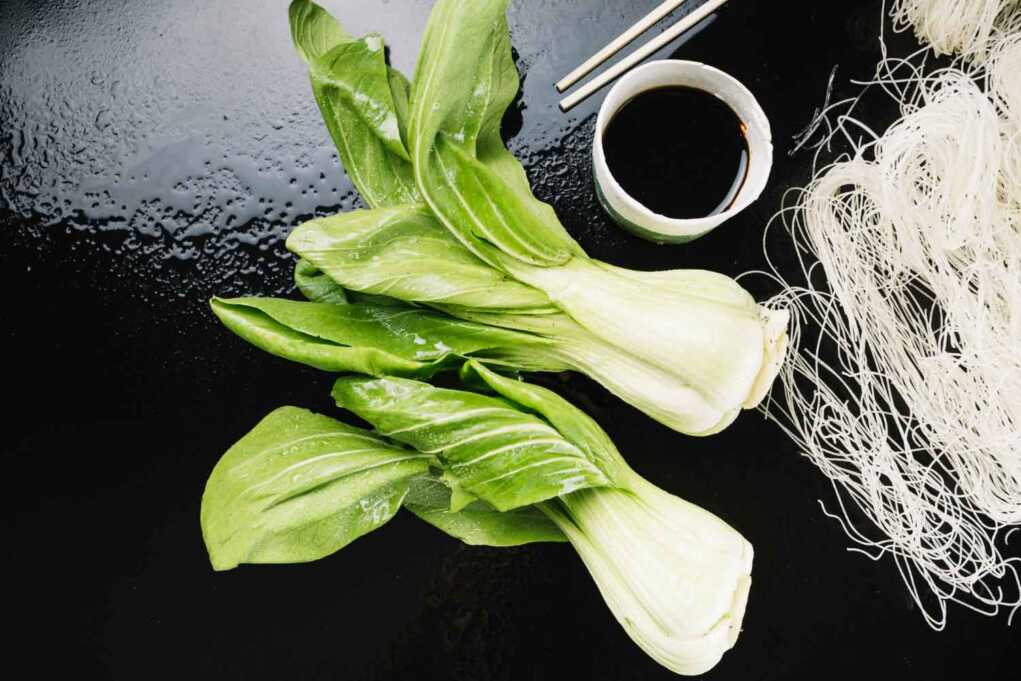
Bok choy, scientifically known as Brassica rapa and sometimes called pak choi, is a dark green vegetable native to China. As part of the Brassica family, it closely resembles other cruciferous vegetables like kale, broccoli, and Brussels sprouts. While it’s widely consumed in Asian cuisine, it continues to gain popularity in other areas of the world due to its many health benefits.
Bok choy’s crunchy texture and ability to absorb flavor make it a prominent ingredient in various dishes. For example, it’s often used in salads, stir-fries, and soups, as it adds bulk and a plethora of nutrients. Bok choy is rich in health-promoting nutrients, such as vitamin A, vitamin C, and vitamin K, calcium, and folate. When included in a well-balanced diet, bok choy’s micronutrient profile can support immune function, bone health, and other markers of health.
May Promote Bone Health
Many of the minerals in bok choy, including calcium, phosphorus, vitamin K, and zinc, can help maintain bone health. Bones are the primary storage site of calcium, adding to their strength and structure. Unfortunately, the body can’t produce its own calcium, so it has to be consumed through dietary intake. Bok choy offers a highly absorbable form of calcium.1
Bok choy also contains small amounts of zinc and iron, both of which support bone health. Zinc plays a significant role in the production of collagen, a protein found in the joints and skeletal system necessary for bone strength and structure.2 Iron, on the other hand, is essential for vitamin D metabolism, a priority in preventing osteoporosis.3
May Support Heart Health
Adding bok choy to a well-balanced diet may help reduce the risk of developing cardiovascular disease. The leafy green vegetable contains potassium, magnesium, and calcium, all minerals that play a role in regulating blood pressure. Some research has found that consuming leafy green vegetables is linked to a lower incidence of cardiovascular disease and a promising strategy for preventing cardiovascular disease events.4
Bok choy also contains a hefty dose of vitamin C, which has been linked to lower cardiovascular disease mortality.5 The antioxidant and anti-inflammatory properties of bok choy, due to its vitamin C content, can promote healthy blood flow by maintaining vascular responsiveness and integrity.6
May Support Weight Management Efforts
Bok choy is low in calories and rich in vital micronutrients, supporting overall well-being and weight management efforts.7 Its fiber and water content make it a filling vegetable, which can help satiate hunger without adding many calories to the day’s total. Plus, it plays a role in appetite control by increasing feelings of fullness, making it less likely for you to reach for a less nutrient-dense snack between meals.
Furthermore, bok choy can be prepared in several different ways, adding variety to your intake. For those who prefer a crunchy snack, consider roasting bok choy halves. Those who want to add fiber and vitamins to their rice side dish can sautée the vegetables with olive oil and garlic before mixing it in. The possibilities are endless.
May Reduce the Risk of Cancer
Like other cruciferous vegetables, bok choy may exhibit anti-cancer properties. While these properties are likely multifactorial, much of their chemopreventive effects are thought to be related to their glucosinolate content.8 Current research has shown that glucosinolates and their breakdown products operate under anti-inflammatory and antioxidant mechanisms. Still, there is a need for continued research on a much larger scale.9
Additionally, bok choy contains a small amount of selenium, a trace element that has shown an inverse association with the risk of prostate cancer, lung cancer, esophageal cancer, and gastric cancer.10 Recent studies have found that high selenium exposure may reduce the risk of many cancers through differing mechanisms.11 There are 0.35 micrograms (mcg) of selenium in 1 cup of shredded bok choy, so one serving may not constitute high selenium exposure, but it can support daily intake.7
Nutritional Facts of Bok Choy
Bok choy, is a low-calorie, nutrient-dense vegetable. Its beautiful green hue adds a pop of color to many different dishes, while its nutrient content enhances their nutritional profiles.
One cup of shredded bok choy provides:7
- Calories: 9
- Fat: 0.14 grams (g)
- Protein: 1.1 g
- Carbohydrates: 1.5 g
- Fiber: 0.7 g
- Vitamin A: 156 mcg (17% daily value)12
- Vitamin C: 31.5 mg (35% daily value)12
- Vitamin K: 31.8 mcg (27% daily value)12
With less than 10 calories per cup, bok choy is an efficient way to increase your vitamin C and K intake without skewing your macronutrient intake. However, because Chinese cabbage is rich in vitamin K, those on blood-thinning medications need to be mindful of their intake. Vitamin K plays a role in blood clotting, so significant changes in your vitamin K intake can interfere with the effectiveness of blood thinners.13
Risks of Eating Bok Choy
While bok choy offers many health benefits, it may also present potential risks for some people when consumed in large amounts. For example, 1 cup of shredded bok choy provides 27% of the recommended daily vitamin K. Since vitamin K is directly involved in blood clotting, those taking blood thinning medication must be mindful of their portion sizes.
Abruptly changing your vitamin K intake can interfere with the effectiveness of these medications and cause alarming health concerns. Still, most people do not need to avoid bok choy and other leafy greens altogether. A registered dietitian can help navigate the ins and outs of nutrition and its potential interactions with prescribed medications.
Additionally, raw bok choy contains an enzyme called myrosinase, which may affect thyroid function by preventing the body from absorbing sufficient iodine.14 Still, cooking the leafy green deactivates the myrosinase, and moderate servings of raw bok choy do not contain alarming amounts of the enzyme.
Tips for Consuming Bok Choy
Bok choy, including all its parts, can be a delightfully nutritious addition to many meals. It’s a staple ingredient for many dishes in Asian cuisine, particularly soups and stir-fries. Here are some tips for preparing and incorporating bok choy into a well-balanced diet:
- Shred bok choy and mix it with other fresh veggies to make a refreshing salad.
- To make a nutrient-dense stir-fry, chop bok choy and cook it in a pan with crispy vegetables like carrots, bell peppers, and broccoli.
- Dice bok choy and mix into a fried rice side dish.
- Cut the bok choy lengthwise and roast the halves.
- Sautée shredded bok choy with garlic, olive oil, and diced mushrooms for a nutrient-dense addition to many meals.
A Quick Review
Bok choy is a nutrient-dense and versatile leafy green vegetable native to China. It’s often used in Asian cuisine as a staple ingredient for dishes such as stir-fries, soups, and salads. It’s low in calories but contains a significant amount of vitamins C and K, making it a welcomed addition to many healthy diets.
Bok choy offers many health benefits through its antioxidant and anti-inflammatory properties. It may support cardiovascular and bone health while potentially reducing the risk of certain types of cancer.
Since raw bok choy contains myrosinase, those concerned about their thyroid function may need to cook down the leafy green before consumption. Additionally, those taking a blood thinner need to be mindful of their intake as bok choy is rich in vitamin K. If you have concerns about bok choy’s potential risks, seek guidance from your healthcare provider or registered dietitian.
Sources:
- Falchetti A, Cavati G, Valenti R, et al. The effects of vegetarian diets on bone health: A literature review. Front Endocrinol (Lausanne). 2022;13:899375. Published 2022 Aug 5. doi:10.3389/fendo.2022.899375
- Suzuki M, Ramezanpour M, Cooksley C, et al. Zinc-depletion associates with tissue eosinophilia and collagen depletion in chronic rhinosinusitis. Rhinology. 2020;58(5):451-459. doi:10.4193/Rhin19.383
- Toxqui L, Vaquero MP. Chronic iron deficiency as an emerging risk factor for osteoporosis: a hypothesis. Nutrients. 2015;7(4):2324-2344. Published 2015 Apr 2. doi:10.3390/nu7042324
- Ojagbemi A, Okekunle AP, Olowoyo P, et al. Dietary intakes of green leafy vegetables and incidence of cardiovascular diseases. Cardiovasc J Afr. 2021;32(4):215-223. doi:10.5830/CVJA-2021-017
- Jayedi A, Rashidy-Pour A, Parohan M, Zargar MS, Shab-Bidar S. Dietary and circulating vitamin C, vitamin E, β-carotene and risk of total cardiovascular mortality: a systematic review and dose-response meta-analysis of prospective observational studies. Public Health Nutr. 2019;22(10):1872-1887. doi:10.1017/S1368980018003725
- May JM, Harrison FE. Role of vitamin C in the function of the vascular endothelium. Antioxid Redox Signal. 2013;19(17):2068-2083. doi:10.1089/ars.2013.5205
- FoodData Central. Chinese Cabbage.
- Abdull Razis AF, Noor NM. Cruciferous vegetables: dietary phytochemicals for cancer prevention. Asian Pac J Cancer Prev. 2013;14(3):1565-1570. doi:10.7314/apjcp.2013.14.3.1565
- Connolly EL, Sim M, Travica N, et al. Glucosinolates from cruciferous vegetables and their potential role in chronic disease: Investigating the preclinical and clinical evidence. Front Pharmacol. 2021;12:767975. Published 2021 Oct 26. doi:10.3389/fphar.2021.767975
- National Institutes of Health. Selenium.
- Cai X, Wang C, Yu W, et al. Selenium exposure and cancer risk: an updated meta-analysis and meta-regression. Sci Rep. 2016;6:19213. Published 2016 Jan 20. doi:10.1038/srep19213
- U.S. Food and Drug Administration. Daily Value on the Nutrition and Supplement Facts Label.
- Leblanc C, Dubé MP, Presse N, et al. Avoidance of Vitamin K-Rich Foods Is Common among Warfarin Users and Translates into Lower Usual Vitamin K Intakes. J Acad Nutr Diet. 2016;116(6):1000-1007. doi:10.1016/j.jand.2015.12.023
- Felker P, Bunch R, Leung AM. Concentrations of thiocyanate and goitrin in human plasma, their precursor concentrations in brassica vegetables, and associated potential risk for hypothyroidism. Nutr Rev. 2016;74(4):248-258. doi:10.1093/nutrit/nuv110
Important Notice: This article was originally published at www.health.com by Chelsea Rae Bourgeois, RDN, LD where all credits are due. Reviewed by Jamie Johnson, RDN
Disclaimer
The watching, interacting, and participation of any kind with anything on this page does not constitute or initiate a doctor-patient relationship with Dr. Farrah™. None of the statements here have been evaluated by the Food and Drug Administration (FDA). The products of Dr. Farrah™ are not intended to diagnose, treat, cure, or prevent any disease. The information being provided should only be considered for education and entertainment purposes only. If you feel that anything you see or hear may be of value to you on this page or on any other medium of any kind associated with, showing, or quoting anything relating to Dr. Farrah™ in any way at any time, you are encouraged to and agree to consult with a licensed healthcare professional in your area to discuss it. If you feel that you’re having a healthcare emergency, seek medical attention immediately. The views expressed here are simply either the views and opinions of Dr. Farrah™ or others appearing and are protected under the first amendment.
Dr. Farrah™ is a highly experienced Licensed Medical Doctor certified in evidence-based clinical nutrition, not some enthusiast, formulator, or medium promoting the wild and unrestrained use of nutrition products for health issues without clinical experience and scientific evidence of therapeutic benefit. Dr. Farrah™ has personally and keenly studied everything she recommends, and more importantly, she’s closely observed the reactions and results in a clinical setting countless times over the course of her career involving the treatment of over 150,000 patients.
Dr. Farrah™ promotes evidence-based natural approaches to health, which means integrating her individual scientific and clinical expertise with the best available external clinical evidence from systematic research. By individual clinical expertise, I refer to the proficiency and judgment that individual clinicians acquire through clinical experience and clinical practice.
Dr. Farrah™ does not make any representation or warranties with respect to the accuracy, applicability, fitness, or completeness of any multimedia content provided. Dr. Farrah™ does not warrant the performance, effectiveness, or applicability of any sites listed, linked, or referenced to, in, or by any multimedia content.
To be clear, the multimedia content is not intended to be a substitute for professional medical advice, diagnosis, or treatment. Always seek the advice of your physician or other qualified health providers with any questions you may have regarding a medical condition. Never disregard professional medical advice or delay in seeking it because of something you have read or seen in any website, video, image, or media of any kind. Dr. Farrah™ hereby disclaims any and all liability to any party for any direct, indirect, implied, punitive, special, incidental, or other consequential damages arising directly or indirectly from any use of the content, which is provided as is, and without warranties.








